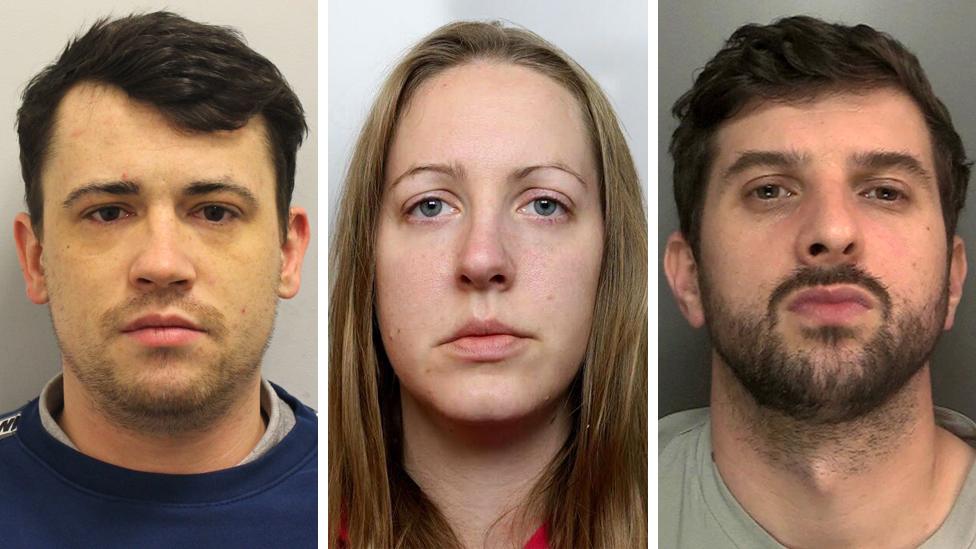Criminals to be forced to attend sentencing hearings
- Published

Killers Jordan McSweeney, Lucy Letby and Thomas Cashman all refused to appear in court for sentencing
Judges are to be given more powers to make criminals attend sentencing hearings in England and Wales under new laws.
It follows several high-profile offenders who refused to appear, including Lucy Letby and the killer of nine-year-old Olivia Pratt-Korbel.
Families of victims say they have previously been denied the right to see justice done.
Powers already exist to compel people to attend but they are not often used.
Now the Ministry of Justice says judges will be able to order an offender to attend a sentencing hearing and make it "clear in law" that reasonable force can be used by custody officers to make sure this happens.
If a criminal refuses to attend despite this order, they could face an extra two years in prison. This will apply in cases where the maximum sentence is life imprisonment, including serious sexual or violent crimes like murder, rape, and grievous bodily harm with intent.
Judges will still have the discretion over whether to compel criminals to hear their sentences in order to avoid distressing victims or families if offenders are likely to be disruptive.
An additional two-year sentence would make no difference in terms of time served to someone like Lucy Letby, who has been given a whole life order, meaning she will never be released.
But a killer on a life sentence is given a minimum term, and an additional sentence could be added, prolonging their time behind bars.
The threat of further prosecution and the use of force to bring a criminal to the dock may encourage all but the most determined criminals to give up their attempts to stay out of the public gaze.
Safety concerns
Judges can make an order for a defendant to appear, and refusing the judge's order can result in prosecution under the Contempt of Court Act. But Ministry of Justice officials say they are only aware of one example in a decade of a judge doing this.
Custody officers can also currently use reasonable force to make criminals attend sentencing hearings.
The privately-run prison transport services employ officers trained and equipped to force prisoners to comply with a court's demands.
However new powers are designed to specifically set out in law that they can use reasonable force when it comes to criminals appearing at sentencing hearings in the dock or via videolink.
The MoJ says custody officers may still have to tell a judge that it is not safe to restrain violent or obstructive criminals.
Labour has backed the government's plans, but said it had "dragged its feet" and called for a detailed timeline.
No exact date has been given for the new law but the prime minister said it would be introduced in the autumn.
The government previously committed to changing the law after the killers of Olivia Pratt-Korbel, Zara Aleena and Sabina Nessa refused to appear in the dock for sentencing and there were renewed calls for new legislation after Letby stopped turning up in court towards the end of jury deliberations.
Prime Minister Rishi Sunak said: "Like many, I was appalled that people who have committed awful crimes somehow are able to take the coward's way out and not appear in court for their sentencing and to hear the impact that their crimes have had on the victim's families."
He added: "People rightly expect criminals to face up to the consequences of their actions."
He was pictured sitting with Olivia's mother, Cheryl Korbel, who has campaigned for the change. She said she hoped Olivia would be "proud" of the change in the law.
"At the end of the day, it's in her name, it's why we've done this," she told ITV News. "And not only in her name, it's for every other family out there that has gone through it."
Sabina Nessa's sister Jebina Yasmin Islam welcomed the announcement saying she was "delighted" to see victims and their families being "put first".
"We've worked hard for this and it's about time that we've seen this change happen," she told BBC Radio 5 Live's Drive programme.
She said Sabina's family felt angry when her killer refused to stand in the dock for sentencing.
"How is this fair? How is this allowed? He murdered my sister, our sister," Ms Islam added.
Labour's shadow justice secretary Steve Reed said it was disrespectful, offensive and "beyond cowardly" that criminals had been refusing to come to court.
"We called for new laws on this back in April last year - but the Conservatives have dragged their feet."
Mark Fairhurst, chairman of the Prison Officers' Association, told the BBC earlier this month: "If we have to force people to appear in the dock, then we have the staff to do it, we have the training to do it, we have the skills to do it. Let's make it happen."